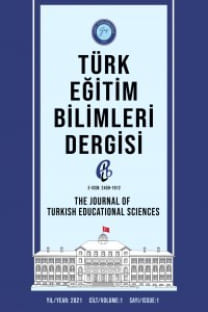LİSE ÖĞRENCİLERİNİN ÇÖZÜNÜRLÜK KONUSUNDAKİ KAVRAM YANILGILARININ TESPİTİ VE GİDERİLMESİ KONUSUNDA YÖNTEMLERİN VE DEĞER BAZI ETKENLERİN ARAŞTIRILMASI
Bu araştırmada, “Çözünürlük” konusu ile ilgili kavramların anlaşılması ve yanlış kavramaların giderilmesinde, geleneksel öğretim yöntemi ile constructivist yaklaşımın etkileri karşılaştırıldı. Bunun için, Ankara/Çubuk lçesinde, Çubuk Lisesi 1. sınıflarından rastgele seçilen, iki sınıftan biri kontrol, diğeri deney grubu olarak belirlendi. Kontrol grubunda geleneksel öğretim yöntemi, deney grubunda yapılandırıcı (constructivist) öğretim yöntemi ile öğretim yapıldı. Öğretimden önce her iki sınıfa da Bilimsel şlem Beceri testi, Mantıksal Düşünme Yetenek testi, Çözünürlük Kavram testi, ön test olarak uygulandı. Çözünürlük Kavram testi, öğretimden sonra her iki gruba, başarıyı ölçmek amacıyla, son test olarak uygulandı. Sonuçların değerlendirilmesi, t-Testi ve ANCOVA ile yapıldı. Son test sonuçları, bazı yanlış kavramaların hâlâ devam ettiğini gösterdi. Yanlış kavramaların nedenlerini araştırmak ve öğrenci görüşlerini ortaya çıkarmak amacıyla mülâkat yapıldı.
Anahtar Kelimeler:
Çözünürlük, yanlış kavramalar, yapılandırıcı öğretim yöntemi, geleneksel öğretim yöntemi, mantıksal düşünme yeteneği, bilimsel işlem becerisi
THE DETERMINATION OF THE MISCONCEPTIONS OF THE HIGH SCHOOL FIRST YEAR STUDENTS AND THE USE OF VARIOUS TECHNIQUES FOR THEIR ELIMINATION
In this study, the effects of traditional method and constructivist approach on the understanding of the concepts and elimination of the misconceptions related to “solubility” were comparatively investigated. To this end, two high school first-year classes in Çubuk High school of Çubuk town of Ankara were randomly selected and assigned as the” control” and “experimental” groups. The control and experimental groups were taught with traditional and constructivist methods separately. Both groups were subjected to scientific process skill test, logical thinking test and solubility concept test as pre- test prior to the teaching process. The solubility concept test was also employed as the final test after the teaching process in order to assess the success of the groups. The data were analyzed using T-test and ANCOVA. The final test results revealed that some of the misconceptions still persisted. Interviews were made with the selected students in order to determine the underlying reasons for these misconceptions and unearth what the students thought
Keywords:
Solubility, misconceptions, constructivist approach, traditional instructional method, logical thinking ability, scientific process skill,
- Başlangıç: 2003
- Yayıncı: ANKARA HACI BAYRAM VELİ ÜNİVERSİTESİ
Sayıdaki Diğer Makaleler
"TESTİN GÜVENİRLİĞİ" VEYA"TEST GÜVENİLİRDİR" DİYE İFADE ETMEK DOĞRU DEĞİLDİR
ORTA ÖĞRETİM ÖĞRENCİLERİNİN, ÖĞRETMENLERİN SINIFTA DİSİPLİN SAĞLAMA YAKLAŞIMLARINA İLİŞKİN GÖRÜŞLERİ
Tayyip DUMAN, Yücel GELİŞLİ, Şaban ÇETİN
EĞİTİM FAKÜLTESİ ÖĞRENCİLERİNİN ÖĞRETME-ÖĞRENME SÜREÇLERİNE YÖNELİK DİRENÇ DAVRANIŞLARI
"TESTİN GÜVENİRLİĞİ" VEYA"TEST GÜVENİLİRDİR" DİYE İFADE ETMEK DOĞRU DEĞİLDİR
İLKÖĞRETİM 4. SINIF BİLGİSAYAR DERS KİTAPLARININ GÖRSEL TASARIM İLKERLERİNE GÖRE DEĞERLENDİRİLMESİ
FEN BİLGİSİ ÖĞRETMEN ADAYLARININ ÖZ-YETERLİK İNANÇ DÜZEYLERİNİN İNCELENMESİ ÜZERİNE BİR ARAŞTIRMA
Süleyman YAMAN, Özlem CANSÜNGÜ KORAY, Alper ALTUNÇEKİÇ
"Testin Güvenirliği" veya "Test Güvenilirdir" Diye İfade Etmek Doğru Değildir.
